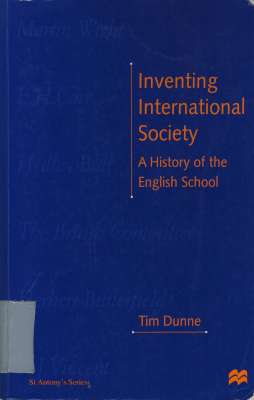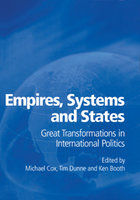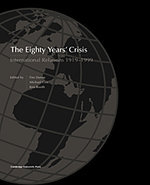 Tim Dunne
Tim Dunne
 Tim Dunne
Tim Dunne
Britischer Politikwissenschaftler; Vertreter der dritten Generation der Englischen Schule, Beiträge zur Theorie der Internationalen Beziehungen, zu Fragen von Menschenrechten und der Welt nach 9/11, Professor of International Relations and Director of Research, Asia- Pacific Centre for The Responisbility to Protect, The University of Queensland, School of Political Science and International Studies.
Werdegang
1989 Bachelor, University of East Anglia
1991 Master in International Relations, St. Anthony's College, University of Oxford
1993 Promotion in International Relations, St. Anthony's College, University of Oxford
1993- 2003 Lecturer am Department of International Politics, University of Wales, Aberystwyth
2003 Professor an der University of Exeter
2004 Head des Departmnets of Humanities and Social Sciences, University of Exeter
2007/08 Sabbatical, (University of Queensland und University of Oxford)
2010 Professor of International Relations an der University of Queensland und Research Director des Asia- Pacific Centre for the Responsibility to Protect.
Preise
Preis der British International Studies Association für die beste Dissertation im Bereich Internationale Beziehungen 1993/1994
Mitgliedschaften
Economic and Social Research Council (ESRC)
Associate Editor der Review of International Studies (1988- 2002)
Mitherausgeber des European Journal of International Relations (2008 ff.)
Mitherausgeber des International Journal of Human Rights
Primärliteratur
Bücher:
Inventing International Society: 
A History of the English School. London: Macmillan 1998
Herausgeberschaften:
mit Steve Smith und Amelia Hadfield
Foreign Policy: Theories, Actors, Cases. Oxford: Oxford University Press 2008.
Mit Milja Kurki und Steve Smith
International Relation Theories: Discipline and Diversity. Oxford: Oxford University Press, 2007. 2. Aufl. 2010.
mit Ken Booth
Wolrds in Collision: Terror and the Future of Global Order. London: Palgrave- Macmillan 2002.
mit Michael Cox und Ken Booth
Empires Systems and States: Great Transformations in Wolrd Politics. Cambridge: Cambridge University Press 2002.
mit Michael Cox und Ken Booth
How Might We Live? Global Ethics for a New Century. Cambridge University Press 2001.
mit Nicolas J. Wheeler
Human Rights in Global Politics. Cambridge: Cambridge University Press 1999.
mit Michael Cox und Ken Booth
The Interregnum: Controversies in Wolrd Politics 1989- 1999. Cambridge: Cambridge University Press 1999.
mit Michael Cox und Ken Booth
The Eighty Years Crisis: International Politics, 1919- 1999. Cambridge: Cambridge University Press 1998.
Aufsätze
mit Marjo Koivisto: Crisis, What Crisis? Liberal Order Building and World Order Conventions. In: Millenium 38.2010,3 S.615- 640
Liberalism, International Terrorism, and Democratic Wars. In: International Relations 23.2009,1. S.107- 114.
Good Citizen Europe. In International Affairs 84.2008,1. S.33- 48
"The Rules of the Game are Changing" Human Rights in Crisis Post 9/11. In: International Politics 44.2007,2. S.269- 286.
Two Foreign Policy Dilemms for the UK Labour Government: The Sale of Hawk Jets to Indonesia and NATO Intervention in Kosovo. In: Carnegie Council on Ethics and International Affairs, Case 522, 2001. S. 1-10.
System, State and Society: How Does It All Hang Together? In: Millenium 34.2005,1. S.157- 170.
When the Shooting Starts: Atlanticism in British Security Strategy. In: International Affairs 80.2004,5. S.811- 833.
"We the Peoples": Contending Discourses of Security in Human Rights Theory and Practice. In: International Relations 18.2004. S.9- 23.
Society and Hierarchy in International Relations. In: International Relations 16.2003,2. S.303- 320.
After 9/11: The End of Human Rights? In: International Journal of Human Rights 6.2002,2 S.67- 76.
East Timor and the New Humanitarian Interventionism. In International Affairs 77.2001,4. S.805- 829.
Sociological Investigations: Instrumental, Legitimist and Coercive Interpretations of International Society. in: Millenium 30.2001,1. S.67- 91.
New Thinking in International Society. In: British Journal of Politics and International Relations 3.2001,2. S.223- 244.
Watching the Wheels Go Round: Replying to the Replies. In: Cooperation and Conflict, 36.2001,3. S. 338- 342.
All Along the Watchtower: A Reply to Critics of Inventing International Society. In Cooperation and Conflict 35.200,2. S.227- 238.
Genocide: Knowing What It Is That We Want to Remember, or Forget, or Forgive. In: International Journal of Human Rights 4.200,3/4. S.27 -46.
The Spectre of Globalization. In: Indiana Journal of Global Legal Studies 7.2009,1. S. 17- 33.
Good International Citizenship: A Thrid Way in British Foreign Policy. In: International Affairs 74.1998,4. S. 847- 870.
International Relations Theory and the Mirror of History. In European Journal of International Politics, 4.1998,3. S.347- 362.
Reading Wight, Writing Australia: Clonial Encounters in International Relations. In: Autralian Journal of International Affairs 51.1997,3. S. 309-323.
The Social Construction of International Society. In: European Journal of International Relations 1.1995,3. S.367- 389.
International Society Theoretical Promises Fulfilles? in Cooperation and Conflict 30.1995,2. S.125- 154.
Weblinks
http://socialsciences.exeter.ac.uk/politics/staff/dunne
http://www.guardian.co.uk/profile/tim-dunne
http://www.timeshighereducation.co.uk/story.asp?sectioncode=26&storycode=408572
DST